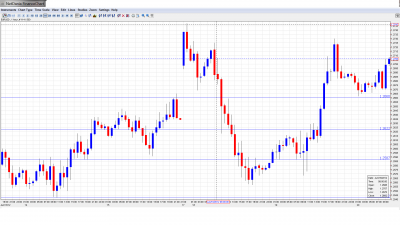After starting the week poorly, EUR/USD recovered yesterday (June 19th), gaining close to one cent. The markets are hoping that the Fed will announce some monetary easing measures today. There is plenty of news in the Euro-zone as well. In Greece, a coalition talks to form a new government are underway. Spain continues to dominate headlines, with bond yields at dangerous levels,raising fears that the announced bailout might already be too small. It seems that without central bank intervention, more falls are on the cards. There was further bad economic news out of Germany, as PPI was weak. The Federal reserve will announce its benchmark interest rate and issue a Rate Statement. As well, there will be a press conference with Fed chief Bernanke.
Here’s an update on technicals, fundamentals and what’s going on in the markets.
EUR/USD Technicals
- Asian session: EUR/USD moved up, reaching a high of 1.2694.The pair consolidated at 1.2688. In the European session, the pair has been choppy, and was trading at 1.2678.
- Current range: 1.2660 to 1.2760.
- Further levels in both directions: Below: 1.2660, 1.2623, 1.2587, 1.2540, 1.2460, 1.24, and 1.2330.
- Above: 1.2760, 1.2814 and 1.2873, 1.29, 1.2960 and 1.30.
- 1.2660 is strengthening in support, as the euro continues to gain ground.
- 1.2760 is a strong line of resistance.
Euro/Dollar moves up as markets hope for QE from Fed – click on the graph to enlarge.
EUR/USD Fundamentals
- 6:00 German PPI. Exp. -0.1%. Actual -0.3%.
- 14:30 US Crude Oil Inventories. Exp. -1.0M.
- 16:30 US FOMC Statement.
- 16:30 US Federal Funds Rate. Exp. <0.25%.
- 18:00 US FOMC Economic Projections.
- 18:15 US FOMC Press Conference.
For more events and lines, see the Euro to dollar forecast
EUR/USD Sentiment
- Will Fed make a move?: There is speculation that Federal Reserve may announce more monetary easing at its policy meeting today. The markets would welcome such a move, but this could be little more than wishful thinking, as Bernanke has stated more than once that there are diminishing returns for QE3. The US benchmark interest rate will likely stay at 0%-0.25%.
- Bailout funds directly buying bonds?: There is talk that Germany would agree to ESM and/or EFSF bailout funds being used to directly buy bonds. This helps the euro.
- Greek coalition talks progressing quickly: Negotiations are going well, so well that a coalition government could be announced as early as today, ending the prolonged political impasse. Any coalition will have a hard time implementing further austerity measures, so the EU, particularly Germany, will have to show some flexibility on the bailout terms if it is serious about keeping Greece in the EZ.
- German data disappoints: After an awful German ZEW Economic Sentiment reading on Tuesday, German PPI contracted by 0.3%, below the market forecast. The once invincible German economy appears to be sputtering, and this could spell disaster for the Euro-zone.
- Spanish yields remain over 7%: Yields on Spanish 10 year bonds remain over 7%, an alarming (and likely unsustainable) level. New reports suggest that 150 billion euros will be discussed. The markets didn’t like the initial 100 billion announcement and quickly found at least 8 holes – including the eventual sum of money, the sources and impacts on other countries, including Greece. Spain is practically begging the ECB to help. So far, the powerful ECB has refused to get involved and provide help. Rating agencies add to trouble by downgrading Spain and its banks, which are intertwined too closely. This toxic mess could lead to Spain being completely shut out of credit markets.
- Dark clouds over Italy: The Euro-zone’s third largest economy is also suffering from dangerously high yields, above 6%. This could spell severe trouble as Italy has a debt larger than its GDP – and the latter is squeezing fast. Italy cannot hide behind Spain for too long. If the economy continues to deteriorate, Italy could be the next EZ member to hop onto the bailout bandwagon.
- G-20 Summit Holds Low Expectations: At their meeting in Mexico, the G20 leaders pledged to consider concrete steps towards a more integrated financial system, including common banking supervision and firm guarantees to repay bank depositors. A European fiscal and banking union would strengthen the euro, bolster the EZ’s anemic growth and lower the high borrowing costs faced by counties with large debts. Such a program could take years to fully implement, but at least the leaders are discussing concrete measures to combat the severe debt crisis.

